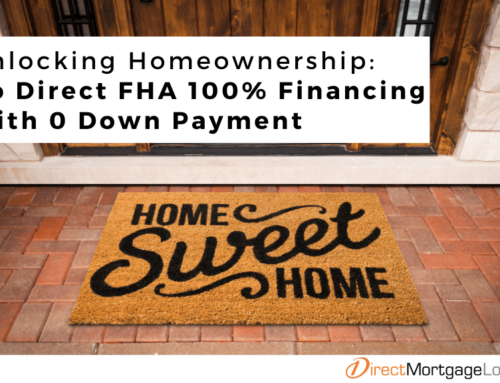Buying a home is one of the biggest financial decisions you’ll make, and choosing the right type of mortgage is a crucial part of that journey. Two of the most common mortgage options are FHA loans and conventional loans, each offering unique benefits depending on your financial situation, homeownership goals, and long-term plans. Whether you’re a first-time homebuyer or a seasoned investor, knowing the ins and outs of these loan types could help you make an informed decision and avoid unexpected costs down the road.
Before diving into the specifics of FHA and conventional loans, it’s important to understand what each loan type offers. This foundation will help you evaluate which loan type best suits your financial needs and homeownership goals.
Subscribe to our blog to receive notifications of posts that interest you!
What is an FHA loan?
An FHA loan is a government-backed mortgage insured by the Federal Housing Administration (FHA). This type of loan was created to make homeownership more accessible, especially for first-time buyers or individuals with less-than-perfect credit. One of the main advantages of an FHA loan is the low down payment requirement, which could be as low as 3.5% of the home’s purchase price.
FHA loans also allow for more flexible credit qualifications, which makes them appealing to buyers who may have experienced financial setbacks in the past. While FHA loans come with mortgage insurance requirements, they offer a solid pathway to homeownership for many buyers who might otherwise struggle to qualify for conventional financing. Consulting a professional at Direct Mortgage Loans could allow you to gain a better understanding of the best loan type for you.
Direct Mortgage Loans is not a credit repair company. This information is for educational purposes only.
What is a conventional loan?
A conventional loan is a type of mortgage that is not insured by the federal government. These loans are typically backed by private lenders and adhere to guidelines set by Fannie Mae and Freddie Mac. Conventional loans are a popular option for borrowers with good credit and stable financial histories.
One of the most significant benefits of a conventional loan is that it can be more cost-effective over time, particularly for borrowers who can make a larger down payment. This is because conventional loans typically come with fewer fees and offer the opportunity to eliminate private mortgage insurance (PMI) once the borrower has established at least 20% equity in the home. Over the life of the loan, this can result in substantial savings compared to FHA loans, which often require mortgage insurance for the duration of the loan regardless of equity. Additionally, borrowers with strong credit profiles may qualify for lower interest rates, further reducing the overall cost of the loan.
Difference Between FHA Vs Conventional Loan
Understanding the key differences between FHA and conventional loans is essential when determining which loan type is the best fit for you. Below is a breakdown of how each loan compares across several important factors.
FHA vs Conventional Loan Debt to Income Ratios
When deciding between FHA and conventional loans, it’s important to understand how lenders evaluate your debt-to-income (DTI) ratio. Your DTI helps determine how much of your monthly income is applied toward debt payments, which in turn impacts how much house you could afford. FHA and conventional loans have different DTI requirements, and those differences may affect your loan approval and budget.
FHA Loan Debt to Income Ratio
FHA loans are generally more flexible when it comes to debt-to-income (DTI) ratios. Borrowers may qualify with a DTI ratio of up to 50% in some cases, depending on other compensating factors like credit score or cash reserves. This flexibility could make FHA loans a better option for borrowers who carry more monthly debt.
Conventional Loan Debt to Income Ratio
Conventional loans typically require a lower DTI ratio. Most lenders prefer a maximum of 43% to 45%, though some may accept higher with strong credit and income profiles. If you have minimal existing debt, a conventional loan might be the more favorable choice. To be sure that a conventional loan is best for you , consult a mortgage professional at Direct Mortgage Loans.
FHA vs Conventional Loan Credit Scores
Your credit score plays a major role in determining your eligibility and loan terms. Lenders use your credit score to assess your financial reliability and likelihood to repay the loan. FHA and conventional loans have different credit score requirements, which could impact your approval and interest rates.
FHA Credit Score Requirements
FHA loans accept lower credit scores, making them accessible to a broader range of borrowers. While a score of 580 or higher qualifies you for a 3.5% down payment, borrowers with scores as low as 500 may still qualify with a 10% down payment.
Conventional Credit Score Requirements
Conventional loans generally require a higher credit score. Most lenders look for a score of at least 620, but a score of 740 or higher will help you secure better rates and terms. This makes conventional loans more suitable for buyers with established credit histories.
Direct Mortgage Loans is not a credit repair company. This information is for educational purposes only.
FHA vs Conventional Loan Down Payment
The size of your down payment could influence not just your loan approval, but also your monthly payments, loan terms, and whether you’ll need mortgage insurance. FHA and conventional loans differ significantly in their down payment requirements, so it’s important to understand what each option entails.
FHA Loan Down Payment
FHA loans require a minimum down payment of 3.5% for borrowers with credit scores of 580 or above. This lower entry point makes them especially attractive to first-time buyers who may not have substantial savings.
Conventional Loan Down Payment
Conventional loans typically require a minimum of 5% down. However, certain programs allow for as little as 3% down for qualified first-time buyers. If you can afford a larger down payment, you’ll not only reduce your loan amount but also avoid or reduce your mortgage insurance requirement. Learn more about your down payment options through a loan officer at Direct Mortgage Loans.
FHA vs Conventional Loan Interest Rates
Interest rates affect how much you’ll pay over the life of your mortgage. While both FHA and conventional loans offer competitive rates, factors that influence those rates—such as credit scores and loan structure—could differ. Here’s how the interest rate landscape compares between the two loan types.
FHA Loan Interest Rates
FHA loans often come with competitive interest rates, thanks to the government backing. However, the overall cost could increase due to the required mortgage insurance premiums.
Conventional Loan Interest Rates
Conventional loans may offer lower interest rates to well-qualified borrowers. If you have a high credit score and a strong financial profile, you might find conventional loans more affordable in the long term.
FHA vs Conventional Loan Limits
Loan limits define the maximum amount you can borrow through each loan type. These limits are set by federal agencies and can vary depending on where you’re buying. Comparing FHA and conventional loan limits helps determine which option aligns best with your homebuying goals.
FHA Loan Limits
FHA loan limits vary by county and are generally lower than those for conventional loans. These limits are set by the Federal Housing Administration and are intended to ensure the program serves lower- to moderate-income borrowers seeking affordable housing. Because FHA loans are designed to make homeownership accessible to more people, the caps on how much you can borrow are adjusted based on local housing market conditions. If you’re looking to buy in a high-cost area or seeking a more expensive home, you may find that an FHA loan won’t cover the full purchase price, requiring you to look into conventional financing or come up with a larger down payment to make up the difference.
Conventional Loan Limits
Conventional loans have higher loan limits, especially in high-cost areas. These limits are set by the Federal Housing Finance Agency (FHFA) and are designed to reflect the local real estate market. In many counties, these loan limits can accommodate homes that far exceed what FHA loans will cover. As a result, conventional loans are often the better option for borrowers who are shopping in competitive or luxury markets where home prices are well above average. They allow buyers to finance larger amounts without needing to secure a jumbo loan, which may come with stricter qualification requirements.
FHA vs Conventional Loan Mortgage Insurance
Mortgage insurance protects the lender in case you default on your loan. Both FHA and conventional loans have their own rules regarding when and how much mortgage insurance is required. Understanding the difference could help you plan for your long-term costs more effectively.
FHA Loan Mortgage Insurance
FHA loans require an annual mortgage insurance premium (MIP), which is divided into monthly installments and added to your mortgage payment. The purpose of this insurance is to protect the lender in case the borrower defaults on the loan, especially since FHA loans are offered to borrowers with lower credit scores and smaller down payments.
One important consideration with FHA mortgage insurance is that it generally lasts for the life of the loan if your down payment is less than 10%. That means even as you build equity in your home, you’ll continue paying MIP—adding thousands of dollars to your total loan cost over time. However, if you put down at least 10%, the MIP requirement may expire after 11 years. This ongoing cost is a key factor when comparing FHA to conventional loans, particularly if you plan to stay in the home long term. While FHA loans offer a great entry point into homeownership, the long-term insurance expense can make them less cost-effective compared to other loan types.
Conventional Loan Mortgage Insurance
Conventional loans require private mortgage insurance (PMI) if you put down less than 20%, which helps protect the lender in case of default. However, one of the key advantages of PMI on a conventional loan is that it’s not permanent. Once you’ve built at least 20% equity in your home—either through paying down your mortgage or a rise in property value—you can request to have the PMI removed. This can significantly reduce your monthly mortgage payments and make a conventional loan more affordable in the long run. Unlike FHA loans, which often require mortgage insurance for the life of the loan, this flexibility is a major financial benefit for qualified borrowers.
FHA vs Conventional Loan Appraisal
Before finalizing your mortgage, a home appraisal is required to ensure the property’s value supports the loan amount. This process protects both the lender and the borrower by confirming that the home is worth what you’re paying for it. FHA and conventional loans each come with their own set of appraisal standards, which can impact your timeline, flexibility, and even whether you can move forward with a particular property.
FHA Loan Appraisal
FHA appraisals are typically more detailed and must meet guidelines set by the Department of Housing and Urban Development (HUD). The appraiser will assess not only the market value of the home but also its condition and livability. This means they’ll look for health and safety concerns such as peeling paint, roofing issues, or missing handrails. If the property doesn’t meet these requirements, repairs may be required before the loan can be approved. While these guidelines are meant to protect buyers, they can sometimes delay the process or disqualify certain homes.
Conventional Loan Appraisal
Conventional loan appraisals focus primarily on the market value of the home, rather than its condition. While the appraiser will still inspect the property, the standards are generally less strict than those for FHA loans. This gives buyers more flexibility when purchasing homes that may need minor repairs or cosmetic updates. As a result, conventional loans may be a better fit if you’re considering a fixer-upper or if you’re in a competitive market where moving quickly is important. Before finalizing your mortgage, a home appraisal is required to ensure the property’s value supports the loan amount. FHA and conventional loans have different appraisal guidelines, which can influence your timeline and buying strategy.
Why to pick a FHA loan vs an conventional loan?
Choosing an FHA loan could offer several advantages depending on your current financial situation and homeownership goals. These loans are designed to be more inclusive, helping individuals and families with limited resources or past credit challenges get into a home sooner. Let’s explore some of the most common situations where an FHA loan may be the better fit. You may want to consider an FHA loan if:
- You have a lower credit score. FHA loans are designed to help borrowers with less-than-perfect credit. If your score is below 620, an FHA loan may be your best option.
- You’re a first-time homebuyer. With lower down payment requirements and more flexible qualifying standards, FHA loans are ideal for buyers entering the market for the first time.
- You have limited savings. The 3.5% minimum down payment could make homeownership more accessible if you haven’t saved a large sum.
Why to pick a conventional loan vs an FHA loan?
While FHA loans are often seen as more accessible, conventional loans could offer significant long-term savings and flexibility for borrowers who meet the qualifications. There are many reasons why a conventional loan might be the best choice, however this all depends on your financial picture. Here’s when it makes sense to go conventional. A conventional loan might be a better fit if:
- You have a strong credit profile. Higher credit scores could help you secure lower interest rates and avoid mortgage insurance more quickly.
- You can make a larger down payment. If you’re able to put down 20% or more, you could avoid PMI entirely, reducing your monthly mortgage payments.
- You’re buying a more expensive home. Conventional loans offer higher loan limits, making them suitable for higher-cost properties.
FHA vs Conventional Loan FAQ’s
When comparing FHA and conventional loans, many homebuyers have similar questions. From qualification criteria to refinancing options, understanding the nuances between these two loan types could help you feel more confident in your mortgage decision. Below are answers to some of the most frequently asked questions to guide you further.
Is it better to get an FHA or conventional loan?
Deciding between an FHA or conventional loan depends on your financial situation. FHA loans are often better for those with lower credit or less savings, while conventional loans may be more affordable long-term for borrowers with strong credit and larger down payments.
Is it better to get an FHA or conventional loan?
There isn’t a one-size-fits-all answer. If you have a lower credit score or minimal savings, an FHA loan may provide easier access to homeownership due to FHA’s more lenient qualifications and lower down payment requirements. However, if you have a higher credit score and can afford a larger down payment, a conventional loan might be more cost-effective in the long run. Conventional loans often come with fewer fees and the possibility of removing mortgage insurance once equity builds. A mortgage specialist at Direct Mortgage Loans could paint a more accurate solution to your loan needs.
Do you have to put 20% down on a conventional loan?
It’s a common misconception that a 20% down payment is required. While putting down 20% does help you avoid private mortgage insurance (PMI), many conventional loan programs allow for much smaller down payments—as low as 3% for qualifying first-time buyers. However, a larger down payment could reduce your monthly payment and total interest over time.
Is it easier to qualify for an FHA or conventional loan?
FHA loans are generally easier to qualify for. They are tailored for borrowers who might not meet the stricter requirements of a conventional loan, such as those with lower credit scores, higher debt-to-income ratios, or limited funds for a down payment. Conventional loans often require stronger credit, lower debt levels, and more consistent income histories.
Are FHA or conventional loans better for refinancing?
It depends on your current loan type, financial goals, and how much equity you’ve built. If you already have an FHA loan, the FHA Streamline Refinance could offer a fast and simplified way to lower your interest rate or monthly payment without a full credit check or appraisal. If you have a conventional loan—or substantial equity and good credit—conventional refinancing may allow you to eliminate PMI and access better interest rates or loan terms.
Rates are subject to change. Eligibility and approval is subject to completion of an application and verification of home ownership, occupancy, title, income, employment, credit, home value, collateral and underwriting requirements. Direct Mortgage Loans, LLC NMLS ID# is 832799 (www.nmlsconsumeraccess.com). Direct Mortgage Loans, LLC office is located at 11011 McCormick Rd Ste 400, Hunt Valley, MD 21031.






Leave A Comment
You must be logged in to post a comment.